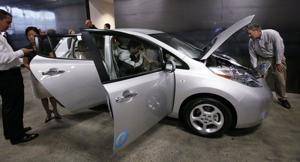Washington lawmakers look to electric vehicles to achieve emissions goals

(The Center Square) – Washington state Democrats want to get serious about climate change this session, but setbacks have pushed them away from electric skylines and towards electric traffic.
Following the failure of one bill this session mandating green energy in new buildings, one bill is riding on the notion that renewables will be the cheaper option more stakeholders will choose once encouraged to weigh their options.
House Bill 1280, sponsored by state Rep. Alex Ramel, D-Bellingham, would have public facilities consider “lowest life-cycle cost alternatives” for buildings with between 25,000 and 100,000 square feet of usable floor area.
The bill, Ramel told his fellow members of the House Environmental Committee on Thursday, is inspired by energy conservation efforts in states like Minnesota, which have used heat pumps to recycle geothermal energy into its buildings with underground piping.
In 2020, around 700,000 geothermal heat pumps were in use out of 123.4 million single, multi-family and mobile homes, the U.S. Energy Information Administration reported.
Places like Washington, Ramel said, ought to consider similar innovations if it can get the state closer to its 2045 climate goals and save taxpayer money.
“This is not a requirement that folks have to build this way,” Ramel said. “It’s just really doing the homework to find out if that will save school district or the local government or the state government money over time.”
The idea of leaving green energy retrofits up to local jurisdictions to decide is largely in response to state mandates this session failing to get past Washington gas lobbies. Critics of HB 1280 doubt state lawmakers have considered the toll that initial costs could have on taxpayers to jumpstart such ambitious projects.
“There doesn’t seem to be either an appreciation or an understanding of all the work that these utilities are going to do and it’s all going to cost money,” said Jeff Pack, a citizen. “Unless somebody has a way of growing money on a tree, those costs are ultimately passed down to us as the consumers.”
That question is growing more concerning to stakeholders as the state looks to electrify half of its 56,000 publicly-owned vehicles by order of Gov. Jay Inslee. The task, according to a state-commissioned report, would require 10,000 new fast-charging stations at the cost of $315 million.
Dave Morin, a lobbyist with the Western States Hydrogen Alliance, touched on such concerns while testifying on Thursday.
“To put it in perspective, a DC fast charger ranges from 150 to 350 kilowatts 350 kilowatts is what it takes to run a Walmart,” Morin said. “The electric infrastructure required to service these have to meet peak demand. So the distribution system has to be looked at.”
House Bill 1287 would accommodate one of Inslee’s top priorities this session of helping more electric vehicle owners find a place to plug in their rides. The bill would require the state Department of Transportation to create a charging station mapping tool and have electric utilities plan for electric vehicle demand in their areas. The state Building Code Council would also plan for electric vehicle building infrastructure by 2024.
Today, some 58,000 plug in electric vehicles are driving on Washington roads. To get the state to its statutory greenhouse gas emissions goals, a million more will be needed by 2030 and 2.2 million by 2035, the state energy office reports.
While electric vehicles retain a tiny market share of the auto market, automakers speculate those will shoot up as hundreds of new electric vehicle models debut worldwide in the coming years.
Among the biggest bottlenecks to getting new electric vehicles into more hands is the time it takes to charge one, which has improved over the years. The Tesla Model 3 boasts a 15 miles per minute recharge rate and a maximum range of 315 miles while the Nissan Leaf’s recharge rate stands at 12.5 miles per minute and can travel for than 200 miles on one charge.
Don McKenzie, associate professor of Civil and Environmental Engineering at the University of Washington, said Thursday that he believes range anxiety is still a hurdle for newcomers to the EV market.
“What we know is that generally people who have EVs experience less range anxiety than people who have not,” McKenzie said. “That’s likely, partly due to the people who choose to buy EV’s are more innovative and more willing to accept those that little bit of risk. But also there’s a learning effect where people become accustomed to the vehicle. So it is still a long ways from being as convenient, seamless, and on demand as driving a gasoline car.”
Under Inslee’s $100 million proposed climate package, some $20 million would be included for transportation electrification including charging stations.
Backed by a range of environmentalist groups and automakers, HB 1287 has drawn some concerns over the cost of overhauling the thousands of gas stations statewide.
Groups like the Washington Food Industry Association told state lawmakers on Thursday public assistance might be needed.
More than halfway through the session, Washington Democrats’ climate agenda has become a mixed bag. One bill establishing emission targets for ride-hailing services failed to see a House floor vote by its March 9 deadline and another aimed at electrify the state’s skyline by 2030 died in committee in February. On the flip side, two bills intended to create a clean fuel standard and include climate change into state planning cleared their respective chambers of origin.
House bills 1287 and 1280 are scheduled to see potential executive action by the House Environment Committee on Tuesday.
Disclaimer: This content is distributed by The Center Square


